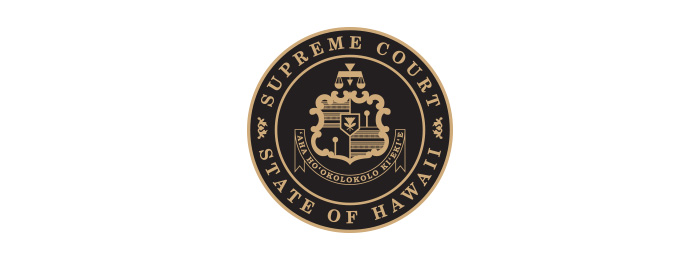Hawaiʻi Judiciary Reaffirms Commitment to Providing Language Access to the Courts
Posted on Mar 7, 2025 in Featured News, News & Reports, Press ReleasesThe entire statement is available in both English and ʻŌlelo Hawaiʻi.
HONOLULU – On March 1, 2025, a presidential Executive Order designated for the first time English as the official national language. The Executive Order rescinds a former mandate that required federal agencies and recipients of federal funding to provide language assistance to non-English speakers.
The Executive Order does not impact Hawaiʻi’s recognition of both English and ʻŌlelo Hawaiʻi as the state’s official languages. The Judiciary reaffirms its policy of allowing people to communicate with the courts in either language.
“Respect for ʻŌlelo Hawaiʻi is a core value of the Hawaiʻi Judiciary,” Chief Justice Mark E. Recktenwald said.
Additionally, one in ten Hawaiʻi residents have limited English proficiency. Without recognizing and accommodating these language needs, a great number of people appearing before the courts or receiving Judiciary services would not be able to meaningfully participate in the justice system.
The Judiciary has dedicated many resources to enhancing language access services for court users. “We are proud to provide such services, including court interpreters for all parties, witnesses, and persons with a substantial interest in a case and language services at all points of contact with the Judiciary, whether in person or over the telephone,” Recktenwald said.
“We assure court users, interpreters, and the public that the Hawaiʻi State Judiciary remains fully committed to providing court interpreters to persons with limited English proficiency or speech or hearing impairments,” added Recktenwald. “We continue to see this as a critical service to assure meaningful access to the courts.”
ʻŌlelo Hawaiʻi translation:
Hōʻoia Hou ka ʻOihana Hoʻokolokolo o Hawaiʻi i Kuleana i ka Hoʻolako ʻAna i Kokua ʻŌlelo i nā ʻAha Hoʻokolokolo
HONOLULU – Ma Malaki 1, 2025, akahi nō a hoʻonoho kekahi Kauoha Hoʻokō i ka ʻōlelo Pelekania ma ke ʻano he ʻōlelo kūhelu aupuni. Hoʻopau ke Kauoha Hoʻokō i kekahi ʻōlelo kēnā mua i koi ka hoʻolako ʻana o nā keʻena pekelala a me nā mea nāna e loaʻa i nā kālā pekelala i ke kokua ʻōlelo no nā poʻe ʻōlelo ʻole i ka ʻōlelo Pelekania.
Mea ʻole ke Kauoha Hoʻokō i kō Hawaiʻi hoʻonoho ʻana i nā ʻōlelo Pelekania a me Hawaiʻi i nā ʻōlelo kūhelu o ka mokuʻāina. Hōʻoia hou ka ʻOihana Hoʻokolokolo i kāna kulekele no ka ʻae ʻana i nā poʻe e hoʻokaʻaʻike me nā ʻaha hoʻokolokolo i kekahi ʻōlelo o nā mea ʻelua.
“He manaʻo kahua o ka ʻOihana Hoʻokolokolo o Hawaiʻi ka mahalo no ka ʻōlelo Hawaiʻi,” mea mai ʻo Luna Kānāwai Kiʻekiʻe Mark E. Recktenwald.
Eia hou aʻe, mākaukau ʻole hoʻokahi o ʻumi mau kānaka noho Hawaiʻi i ka ʻōlelo Pelekania. Me ʻole ka hoʻomaopopo ʻana a me ke kokua ʻana i kēia mau nele ʻōlelo, nui hewahewa nā poʻe e kū ana i mua o nā ʻaha hoʻokolokolo a i ʻole e loaʻa ana ka lawelawe ʻOihana Hoʻokolokolo hiki ʻole ke komo pono i ke kahua kaulike.
Hoʻokaʻawale ka ʻOihana Hoʻokolokolo i nā pono he nui no ka hoʻomāhuahua ʻana i ke lawelawe kokua ʻōlelo no nā mea hoʻohana i ka ʻaha hoʻokolokolo. “Haʻaheo mākou i ka hoʻolako ʻana i ia mau lawelawe ʻana, e like me ka mahele ʻōlelo ʻaha hoʻokolokolo no nā ʻaoʻao a pau, nā mea ʻike maka, a me nā poʻe me ke kuleana koʻikoʻi i kekahi hihia, a me ka lawelawe kokua ʻōlelo i nā hoʻopili ʻana a pau me ka ʻOihana Hoʻokolokolo, i ka holo kino ʻana a i ʻole ma ke kelepona,” mea mai ʻo Recketenwald.
“E haʻi hoʻākāka leʻa mākou i nā mea hoʻohana i ka ʻaha hoʻokolokolo, nā mahele ʻōlelo, a me ke lehulehu e kūpaʻa mau ka ʻOihana Hoʻokolokolo o Hawaiʻi i ka hoʻolako ʻana i mahele ʻōlelo ʻaha hoʻokolokolo i nā kānaka mākaukau ʻole i ka ʻōlelo Pelekania, a i ʻole pilikia ka haʻi waha ʻana, a i ʻole pilikia ka lohe ʻana,” haʻi maila ‘o Recketenwald. “Hoʻomaopopo mau mākou, he lawelawe kokua koʻikoʻi loa kēia no ka hōʻoia ʻana i ke ala māhuahua i nā ʻaha hoʻokolokolo.”
For more information, contact the Communications and Community Relations Office at 808-539-4909 or via email at pao@courts.hawaii.gov.
Subscribe to the Hawai'i State Judiciary mailing list for email notification of press releases and other announcements.

